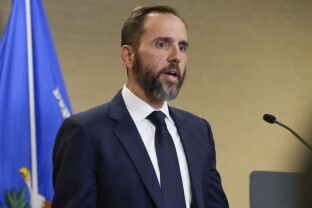A federal judge on Wednesday unsealed a highly anticipated report from Department of Justice special counsel Jack Smith, which lays out why prosecutors think Donald Trump was acting far outside his official duties when he pushed to overturn the 2020 election results.
“At its core, [Trump’s] scheme was a private criminal effort,” they wrote, adding that he “used deceit to target every stage of the electoral process.”
The filing foreshadows what kind of evidence prosecutors expect to present at what would be the first ever federal criminal trial of a former president — if it ever happens.
Although much of the filing rehashed details of Trump’s efforts to remain in power that have slowly leaked in the past three years, it did include some new revelations — and showed the extent to which the investigative work already conducted by the now dormant House Jan. 6 Committee uncovered the most damning aspects of Trump’s personal involvement.
In the filing, prosecutors claim that Trump knew better — and consciously moved forward with lies meant to throw the nation and democratic process into tumult.
For example, prosecutors cited evidence that Trump’s 2020 campaign manager and a private advisor “informed him that it would be a close contest and that it was unlikely to be finalized on election day” due to mail-in ballots during the COVID-19 pandemic.
“Privately, [Trump] told P6, campaign personnel, P7 (a White House staffer and campaign volunteer), and [Vice President Mike Pence chief of staff Marc Short] that in such a scenario, he would simply declare victory before all the ballots were counted and any winner was projected,” the prosecutors wrote.
Although the vast majority of the people listed in the court filing had their names redacted, NOTUS identified several by cross-referencing files released by the Jan. 6 Committee as well as tweets and statements cited by prosecutors.
Prosecutors were forced to craft the 165-page court filing in an effort to overcome the Supreme Court’s new expansive definition of presidential immunity. Prosecutors asked U.S. District Judge Tanya Chutkan to “determine that the defendant must stand trial for his private crimes as would any other citizen.”
Building on evidence first gathered by the House Jan. 6 Committee, prosecutors also pointed to the way close Trump ally and right-wing media personality Steve Bannon told a private group of supporters days before the election: “And what Trump’s going to do is just declare victory. Right? He’s going to declare victory. That doesn’t mean he’s the winner, he’s just going to say he’s the winner.”
Prosecutors hinted at the extent to which Pence assisted in the investigation, describing how “Pence gradually and gently tried to convince the defendant to accept the lawful results of the election, even if it meant they lost.”
Pence offered what prosecutors called “a face-saving option” when he told Trump during a private lunch on Nov. 12, a week after the election: “Don’t concede but recognize the process is over.”
Trump told a family member, “It doesn’t matter if you won or lost the election. You still have to fight like hell,” according to someone prosecutors described as a White House staffer who traveled with him.
Prosecutors also discovered that Rudy Giuliani spoke to Trump “on the phone for almost twenty minutes” the morning before New York’s former mayor made a presentation in front of the Georgia state Senate’s judiciary subcommittee where he lied about more than 10,000 “dead” people voting in the 2020 election, when evidence pointed to a number closer to 12.
Trump’s defense lawyers tried to stop the release of the filing earlier this week, calling it a “politically motivated manifesto” specifically timed to influence voters “in the final weeks of the 2024 Presidential election while early voting has already begun throughout the United States.”
While their efforts to keep the filing under seal failed, the future of the case remains an open question. The case has been so heavily delayed by a late start from Attorney General Merrick Garland, appeals from Trump’s legal team and a Supreme Court that slow-walked its landmark opinion that the entire process could be moot if Trump wins the election in November, as he would likely direct the DOJ to drop the investigation entirely.
—
Jose Pagliery is a reporter at NOTUS.
Sign in
Log into your free account with your email. Don’t have one?
Check your email for a one-time code.
We sent a 4-digit code to . Enter the pin to confirm your account.
New code will be available in 1:00
Let’s try this again.
We encountered an error with the passcode sent to . Please reenter your email.


